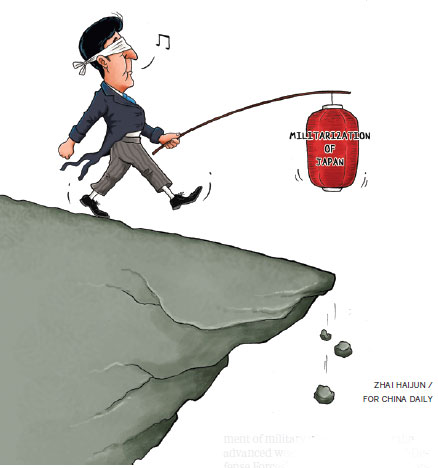Abe has taken the military path to failure
The Japan Maritime Self-Defense Force has been providing refueling services for US vessels keeping vigil for possible missile launches by the Democratic People's Republic of Korea since April, according to Japanese media reports. Japanese maritime forces' ships have supplied fuel to US vessels equipped with the Aegis anti-missile defense system in the Sea of Japan and elsewhere at least once a month, Japanese officials said.
This new development has been made possible by a 2015 security legislation, which widened the scope of military cooperation between the United States and Japan by adding missile defense and anti-piracy activities to a list that also includes joint drills.
The refueling operations, along with other activities, such as rising military budgets and military exercises, and the purchase of advanced weapons, show Japan's security policy of "exclusively for defense" is undergoing rapid change. It would not be wrong to say that Prime Minister Shinzo Abe's administration is pursuing a "self-defense" policy of strengthening the military. In fact, since becoming prime minister for the second time in 2012, Abe has been trying to amend the postwar pacifist Constitution to make Japan a military power.
From "exclusively for defense" to "taking initiatives for defense", and from "basic defense" to "mobile defense", the Abe administration has frequently revised Japan's defense policies and promulgated new ones, almost changing Japan's defense posture from "defensive" to "offensive" in an effort to "militarize Japan".
To realize his dream, Abe has coined the term "active pacifism" and issued three security policy documents - Japan's first national security defense strategy, a new defense plan outline and a plan for medium-term adjustments of the defense forces - or the "three arrows" for Japan's security and defense. In this sense, "active pacifism" marks Abe's new path in his pursuit of "militarization" on the pretext of "maintaining (Japan's) international interests".
But "active pacifism" has exposed Abe's military ambitions, as he has been allocating increasing amounts of resources for research, development and procurement of military weapons. Among the advanced weapons on the Japan Self-Defense Forces' list are Izumo-class helicopter destroyers, F-35 fighters, Global Hawk Unmanned Aerial Vehicles and other stealth planes, amphibious armored vehicles and submarines.
And the Japanese Ministry of Defense has sought 5.25 trillion yen ($44.7 billion) for its 2018 fiscal budget, a 2.5 percent increase year-on-year, so that it can purchase land-based Aegis anti-missile defense system and other anti-missile equipment.
Japan attaches great importance to not only military "hardware", but also military "software" such as real-combat technologies and experience. Japan Self-Defense Forces personnel have frequently held training programs and drills with the US military and visited the US to receive advanced training. Some Japan Marine Self-Defense Force destroyers held a joint exercise with a US aircraft carrier formation in the Sea of Japan to strengthen cooperation with the US Navy. And on Aug 24, the Self-Defense Forces, including land and maritime personnel, conducted a massive military drill at the foot of Mount Fuji simulating island recapture.
Japan has been using all means possible to hype the volatile security environment in its neighborhood, in order to promote the Abe administration's "expansive" defense policy. In this year's national defense white paper, issued earlier this month, the Japanese government has again used the "China threat" theory as a pretext to justify Abe's controversial "active pacifism", gain public support for restoring Japan's collective self-defense rights, clear the way for the Self-Defense Forces' expansion, and revise the pacifist Constitution.
The Abe administration has breached the peace commitment Japan made to the world and deviated from its peaceful development road. History is witness that those intoxicated with power or military are doomed to failure. Japan, therefore, should use history as a mirror to judge itself, abandon the pursuit of "military power", embark on a peaceful development road, and do more to enhance mutual trust with its neighbors, so as to maintain regional peace and stability.
The author is a journalist with the People's Liberation Army Daily, in which the article was first published.



















